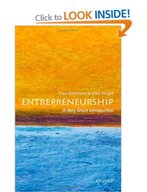Cases
|
These two cases are available as both PDF and MP3 audio (20 minutes)
I will introduce them at the workshop. Look for similar material available from The Times 100; and there is more at www.business2000.ie. |
|
University of Ulster
|
Visit regularly, especially for access to the Library resources.
|

P Westhead and M Wright, 2013 A Very Short Introduction - Entrepreneurship, Oxford University Press, Oxford
This is a short but very valuable overview of the subject area, containing much that is relevant to the key points in this area of management. It is also available as a Kindle edition.
This is a short but very valuable overview of the subject area, containing much that is relevant to the key points in this area of management. It is also available as a Kindle edition.

A page (below) to provide an opportunity as you explore your own entrepreneurial traits.
| bmg533_traits_.docx | |
| File Size: | 120 kb |
| File Type: | docx |
|
nibusinessinfo
|
This is a substantial and valuable resource, serving the needs of managers in a very wide range of different work environments.
Spend some time investigating the range and relevance of resources available here, concentrating primarily on those that are likely to have greatest value for your own business planning activities. |
 Professor Mark Hart
Professor Mark Hart Aston University and GEM
(and formerly of the University of Ulster)
Global Entrepreneurship Monitor
GEM is a not-for-profit academic research consortium that has as its goal making high-quality international research data on entrepreneurial activity readily available to a wider audience.
Viewing entrepreneurship as a process, GEM considers people engaged in entrepreneurial activity in several different phases:
GEM is a not-for-profit academic research consortium that has as its goal making high-quality international research data on entrepreneurial activity readily available to a wider audience.
Viewing entrepreneurship as a process, GEM considers people engaged in entrepreneurial activity in several different phases:
- The potential entrepreneur, who has some relevant knowledge and skills and has an ability to spot an opportunity to conceive the new business
- The nascent entrepreneur, who needs the energy and focus to set up the business
- The owner manager of a new business, responsible for the early stages of business development
- The owner manager of an established business (over three years old), responsible for its development and further growth.
|
Businessplannavigator
|
Helen McKenna of Clarity Business Training has worked to provide this resource.
I look forward to discussing with you when we meet at the second day of the face-to-face workshop the various strengths and weaknesses of the approach adopted here. |
|
Two for those with an interest in business planning for social enterprises: Cheshire Social Enterprise Use the search term market research for community enterprises. Identify any organisations that have toolkits or templates that may be of value to your own work. Look, for example, at what is available in Cheshire. Freer Spreckley Also: Use the search term Freer Spreckley British Council to find out more about a social audit toolkit that has been developed for social enterprises in South East Europe. |
 Etienne Wenger Etienne Wenger
|
Communities of practice
Online communication has helped professionals who share common interests around the world to meet and collaborate in virtual environments. Etienne Wenger and his colleagues have done much to provide academic underpinning to the approaches used by different groups. Find out more at their website. Look also at the document attached below.
|
||||||
 Chris Anderson
|
How to give a killer presentationHarvard Business Review, June 2013
For more than 30 years, the TED conference series has presented enlightening talks that people enjoy watching. In this article Chris Anderson, TED's curator, shares five keys to great presentations: - Frame your story (figure out where to start and where to end). - Plan your delivery (decide whether to memorize your speech word for word or develop bullet points and then rehearse it--over and over). - Work on stage presence (but remember that your story matters more than how you stand or whether you're visibly nervous). - Plan the multimedia (whatever you do, don't read from PowerPoint slides). - Put it together (play to your strengths and be authentic). According to Anderson, presentations rise or fall on the quality of the idea, the narrative, and the passion of the speaker. It's about substance - not style. In fact, it's fairly easy to "coach out" the problems in a talk, but there's no way to "coach in" the basic story - the presenter has to have the raw material. So if your thinking is not there yet, he advises, decline that invitation to speak. Instead, keep working until you have an idea that's worth sharing. Use the guidance provided here as you think about the presentation element of your assignment. |
|
And there's more ...
This is a miscellany of resources that have been nominated by earlier generations who have taken this module. Spend the few minutes exploring each of them to decide if they are further use. |
For inspiration!
www.springwise.com Enterprise Ireland www.enterprise-ireland.com National Enterprise Network www.nationalenterprisenetwork.org Sage www.sage.co.uk/discover School for Startups www.schoolforstartups.co.uk Belfast City Council www.belfastcity.gov.uk/businessprogrammes Startup Britain www.startupbritain.org Startup Donut www.startupdonut.co.uk Startups www.startups.co.uk Ulster Bank www.smallbusinesscan.com Writing a business plan www.gov.uk/write-business-plan |




